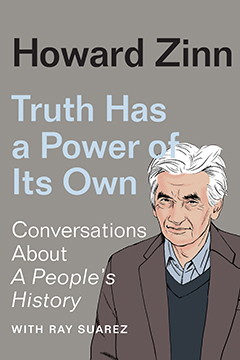Words of Wisdom from Howard Zinn
By:
DerekWednesday, August 24, 2022

Author, activist, and historian Howard Zinn would have turned one hundred years old on August 24, 2022. To celebrate his birthday we’ve collected some powerful quotes from Zinn’s Truth Has a Power of Its Own: Conversations About A People’s History. A longform interview with journalist Ray Suarez, Truth Has a Power of Its Own looks back on the writing of his most famous work, and offers reflections on the American past, present, and future as applicable now as they were when A People’s History of the United States was first published.
* * * * * * *
On constructing a usable American past to shape a more just and equitable country:
“It’s a history, I think, that makes the listener, the reader, the imbiber of history, more of a human being and also more of an active person. If the heroes are the important decision makers, all you have to do as a citizen is to go to the polls every two or four years, pull down the levers and elect another savior. But now if you take this other set of heroes, your role as a citizen is not simply to vote but to become an active person in a movement for social justice. It’s not just voting once every few years. It means every day becoming part of some social movement that wants to make the country and the world better.”
A reinterpretation of American history and its under celebrated actors:
“What history shows is that people who seemed to have no power—who did not have the money, people who did not have military forces at their disposal, who did not control the means of communication—were able nevertheless at certain points in history to change their lives because they found their own kind of power—the power of organized people. They found that if the people who are troubled by their lives organize in enough numbers and persist long enough, and are willing to take enough risks, they can overcome the people who seem to have all the power.”
On overcoming the sclerosis of the American political order:
“We benefit by recognizing that, if we’re going to change society, we cannot depend on something created two hundred years ago by the Founding Fathers, and we cannot depend on the people in power. We cannot depend on the president and Congress and the Supreme Court. Looking at this long thread of struggle and looking at the way things have changed, we learn that it’s up to us, as citizens. It makes us better citizens. It makes us active citizens, more than voters. It makes us people who day-to-day get together with other people. It really gives us a new idea of democracy. Democracy does not come from the top. Democracy comes from ordinary people seeing what they have in common and seeing what they are lacking. When ordinary people get together, they put their energy together. They protest together, they demand things together, they form a movement—and that is how change takes place. That is how we can get closer and closer to the ideals of the Declaration of Independence.”
On the role of the historian, particularly relevant given backlash over the teaching of America’s unflattering moments:
“I suppose that it might be considered an unprofessional thing for a historian to write a history that somebody else interprets as a call to action. But to me, the historian is a citizen before he is a historian. The historian is a human being before he is a historian. He is not a historian, in my view, just to be a historian— just to teach history, just to write books, just to go to professional meetings. I assume that a historian is somebody who cares about what is going on in the world, someone who studies history and teaches history and writes about history in a way that will have a beneficial effect on the world.”
And lastly, an important, optimistic reminder and call for solidarity:
“There are people everywhere who want to see a different kind of world, who want to be at one with their fellow men and women, who think that people in other countries are human beings as we are, and that if somebody is suffering anywhere in the world, we have a responsibility to help them. I believe that that compassion is basic to human nature. And I am counting on that to pull us through.”
For more from Truth Has a Power of Its Own, download the free ebook A Life of Activism: Howard Zinn in His Own Words—Selected Writings for the Centennial, a compilation published in celebration of the hundredth anniversary of Howard Zinn’s birth, and checkout our reading list “5 Essential Books by Howard Zinn.”
* * *
This post was written by Ben Metzner, a Comparative Literature and History double major at Yale University and a Summer 2022 New Press Intern.
Blog section:
